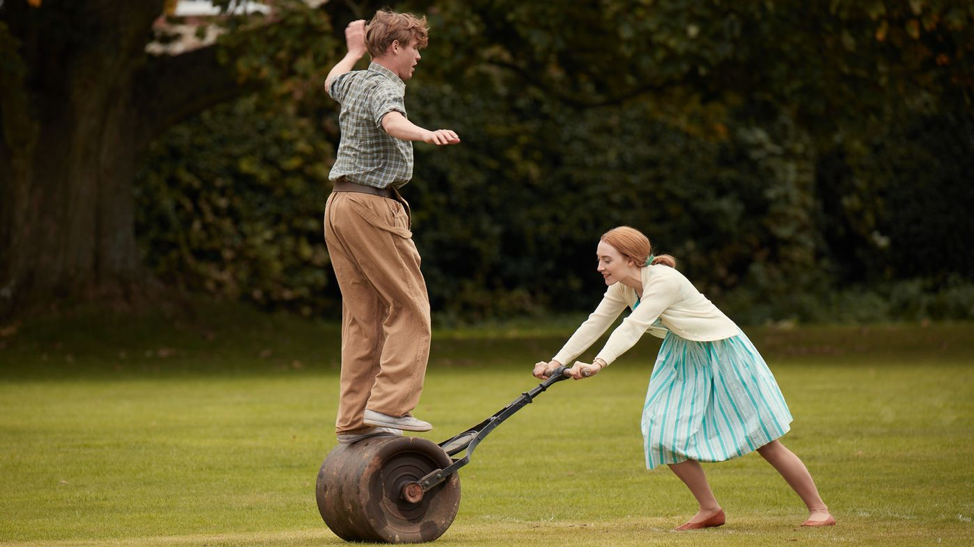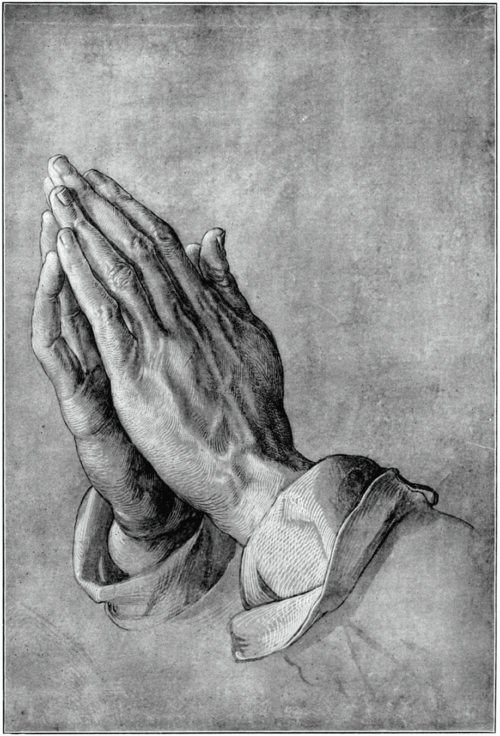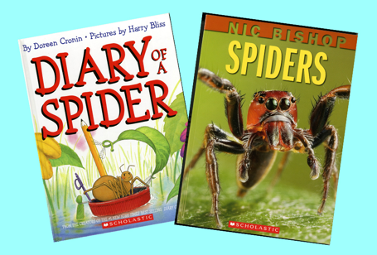There are so many great things to do in New Orleans. It was the last stop on our odyssey through the South, but with temperatures in the mid-90’s and only 48 hours in town, M and I opted to pass on the sites and do some serious speed eating. We were there four years ago and tried several of the better-known restaurants – Emeril’s, Central Grocery, Café du Monde, Johnny’s Po’ Boys, Superior Seafood – and I had eaten at Brennan’s and Commander’s Palace in years past. This time we were looking for a more local experience. Two friends, a public defender in NOLA and another friend who went to school at Tulane, gave us their top picks. So, we culled the list of referrals and came up with four – dinner at Upperline, lunch and dinner the next day at Pêche and Jewel of the South, and lunch at Le Petite Grocery before heading to the airport.
Archive for Weather – Page 2
I secretly hoped that the visit would be like the one to the car mechanic where, after an exhaustive inspection, the technician shakes his head, declares the problem non-existent, and hands me a bill for the labor. It turns out, luckily, that my suspicions were right; my doctor took three readings in the 120/70 range, smiled knowingly, and sent me home…with a bill for services.
In retrospect, my own diagnosis is “transient Donald Trump effect.” Hours spent listening to MSNBC tweet storm after tweet storm. After a while my muscles tense, my blood pressure rises, and I begin to shout at the TV. Not a blood pressure problem – just a form of global political stress. I’m sure I’m not alone, but if I’m going to survive the next two years I need to divine a coping strategy.
So, reassured that BP is not the problem, Marilynn and I began thinking of a survival strategy. Our first act was to acknowledge that our preference for dark little art films probably wasn’t increasing our joy and feeling of well-being. In the past few weeks we’ve seen Black Klansman, Collete, Can You Ever Forgive Me, The Wife, and Roma. None of them have you leaving the theater with a smile on your face. We need to let our affection for these dark, arty films slide for the time being. On Christmas Day we substituted Mary Poppins Returns.
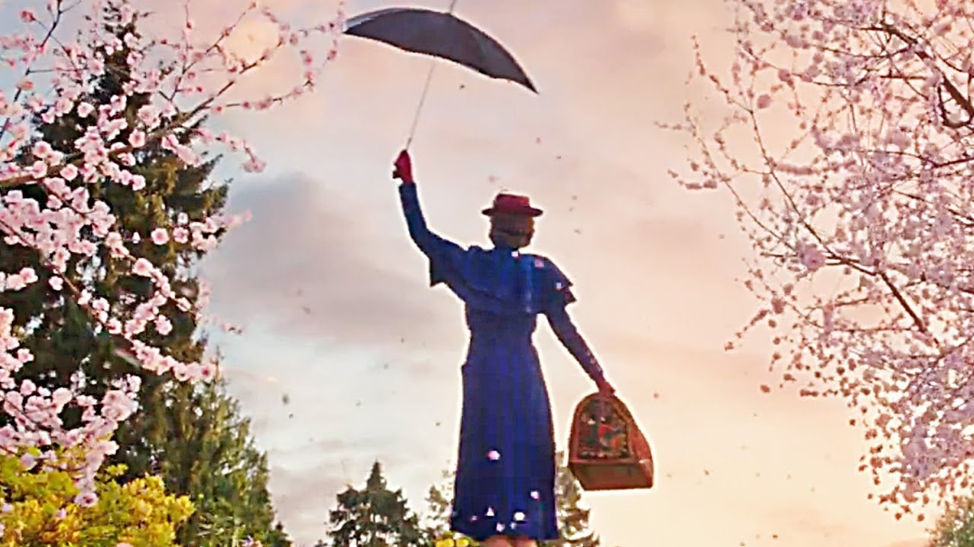
I was skeptical but willing to try. Would this just be saccharine eye/ear candy? Those of you who know me will understand. I’m not a fan of animated films (there is animation). I’m not attracted to special effects where people fly (Mary flies). And, feel good films made primarily for children (this is one of those) are not in my wheelhouse. So, Mary Poppins Returns looked like a serious test of our new strategy. Surprisingly, it passed with flying colors (no pun intended) thanks to Emily Blunt and Lin-Manuel Miranda, and I really did leave the theater smiling.
I’ve grown to love modern technology. Almost everything has a digital analog these days, and with TiVo and Roku there are so many options from Amazon Prime Video, Netflix, YouTube, Pandora and others. When I was learning how to use a computer (remember MS-DOS?) one of my motivations was knowing that if I mastered the basics, I could access the New York Public Library’s reference section. Imagine… Today, MS-DOS is ancient history and so are Internet Explorer, Alta Vista, Yahoo and the other early search engines. Today, it’s all about Google and research is as close as your next key stroke. My daughter writes for national publications from her Hailey, Idaho home and my wife manages a senior health care consultancy from Saigon, Berlin, Paris, and Rome – wherever we happen to be – with her MacBook Pro.
So, after seeing Mary Poppins Returns, we came home and pulled up YouTube on our living room TV and watched parts of the original Julie Andrews/Dick Van Dyke version, saw interviews with the actors, songwriters, screenwriters, and directors of both versions, and… it sounds pretentious, but also talked about the relevance of Mary Poppins to what’s going on in the world today.
Think about the films–both Mary Poppins’ versions. They’re about young families with small children. The Banks families – Jr. and Sr. They’re both struggling financially. In Returns the young mother dies. The distraught husband, a teller at the bank that holds the deed, neglects to make a house payment (the wife’s job) and they fall behind on their mortgage. The evil bankers, pretending to help, foreclose. In the first film the father, is fired by Mr. Dawes, the evil banker, but dies laughing at one of Mr. Banks’ Sr.’s jokes. I won’t give away the ending of the new film, but it’s equally satisfying.
So, how far do we have to go to find real life parallels? Not so far, it turns out. Trump’s Secretary of the Treasury made a fortune foreclosing on sub-prime mortgages sold to vulnerable people who shouldn’t have been given mortgages in the first place. In November, Munchkin and his thin-skinned trophy wife were making news at the US Mint while simultaneously disparaging the poor unfortunates who are unable to afford the luxe items she lives for. Indulge me while I imagine the Munchkins dying of laughter on their way to the bank. Life imitates art?
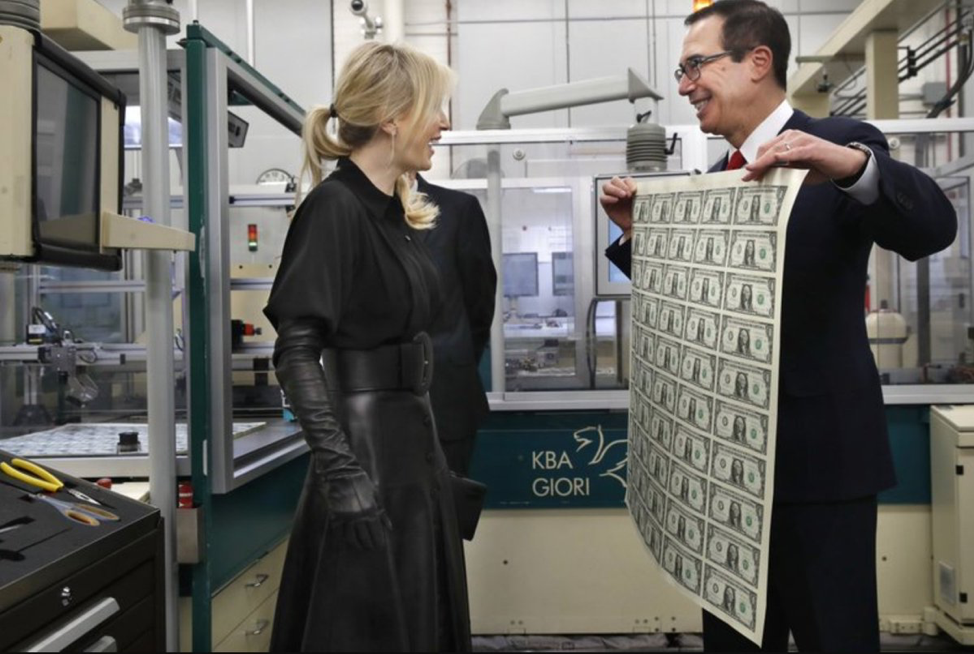
So… the strategy is working. My blood pressure is down and I’m having so much fun I’ve forgotten about Donald J. Trump. I’m reminded of Norman Cousins’ book Anatomy of an Illness in which Cousins, afflicted with a life-threatening disease, initiated a revolution in patient care by adopting the innovative theory that humor can marshal the body’s natural resources to combat disease. Thank you, Mr. Cousins; you and Mary Poppins have me smiling again. We’re on a roll.
Marilynn is lifelong fan of musical theater and she has brought me along in the last few years. They’re seductive and habit-forming. Two weeks ago, we saw Lin-Manuel Miranda’s In the Heights, another feel good, smile generating musical – this one with an immigrant theme. How timely. These feel-good entertainments are charged with deeper meanings. Who knew?
At the end of Mary Poppins Returns, Mary flies away, and and as we left the theater we reminisced about how other musicals had also made us feel good. We remembered seeing Singing in the Rain for the first time and after checking out the Mary Poppins stuff on YouTube, we went to Amazon Prime and put Singing in the Rain on our watchlist. I suppose it’s the time we live in, but in these perilous times it’s easy to find secret messages in these feel-good movies.
Singing in the Rain is about how technology changed the film industry. It’s hard to find a more current topic. In the musical, the story line is about the transition from silent films to talkies. The star, Lina Lamont (Jean Hagen), loses her star role because of her shrill voice and Queens accent while Kathy Selden (Debbie Reynolds) becomes a star because she can sing, dance – and talk. No lip synching (yes, lip-synching is what brings Lina down). Think Milli Vanilli, Ashlee Simpson, and Victoria Beckham.
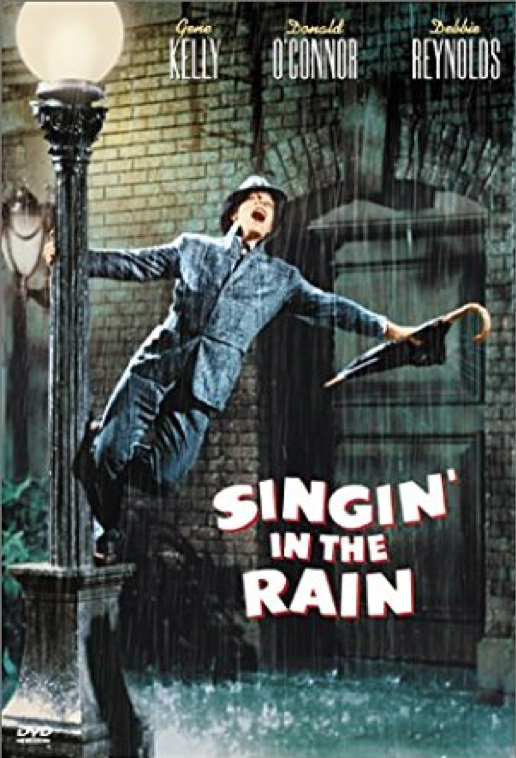
And, if you think it’s a stretch to see Singing in the Rain as political, check out how the Sunshine State News (Florida rag) uses it vis a vis today’s news.
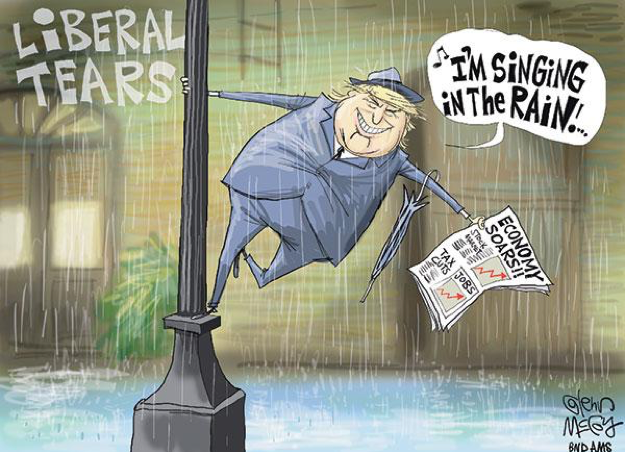
In any event, I think we’re on to something. It’s important to find some balance in our lives and coping strategies to deal with both disease and Donald Trump. Trump will be gone soon enough, relatively speaking, but if we’re not in good health it won’t matter. Find your own survival strategy. For now, finding things that make me smile and take me briefly away from Oval Office tweet storms, is my strategy. To die laughing isn’t a bad end is it Mr. Banks?
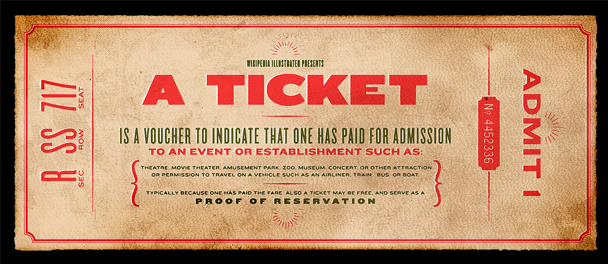
I won’t be surprised if you’ve never heard of Steve Piper. I hadn’t either, but here’s the point; Steve is a journeyman singer-songwriter I heard last month while traveling in Western Massachusetts, and in this life, when you’ve been around for a while, you begin to appreciate how much talent there is – in your neighborhood, in your city, maybe even in your own family. I’ve been saying this for a long time, but it hard registered last month when I heard Steve play one night in Stockbridge.
That night, after a day meandering around the Berkshires of Western Massachusetts, we decided to see if we could track down a good burger. There weren’t a lot of choices but the Lion’s Den in the basement of Stockbridge’s Red Lion Inn looked promising. There were a few other patrons, but it wasn’t crowded. We settled in, ordered burgers, a Pinot Grigio and a draft ale.
I’m not a good judge of age anymore. I tend to think anyone with gray hair and a few wrinkles is my age. Not true, but my tiny mind wants to believe it. Regardless, about 9 p.m. a guy “about my age” took the small stage, tuned his Martin, and did a short sound check while we were waiting for our burgers.
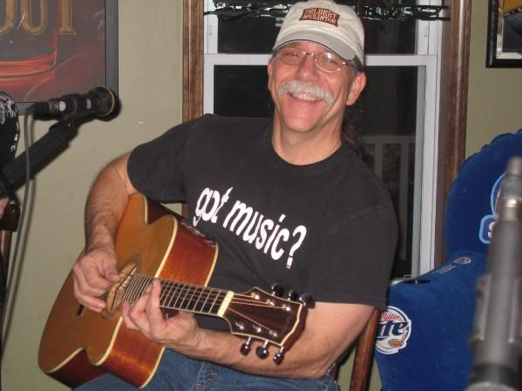 As noted above, there is an immense about of talent in the world, and when Steve Piper, the guy nobody’s ever heard of, opened his set with a 12-bar blues run and the first verse of Sweet Home Chicago I knew we were in its presence. I didn’t talk with him, so I don’t know if he makes his living as a musician or pounds nails on a local construction crew, but he was good and it was a treat to listen to him play and sing. We stayed for two sets as he covered John Prine’s Angel From Montgomery, some Stevie Ray Vaughan, and one or two of his own songs. Good stuff… and live.
As noted above, there is an immense about of talent in the world, and when Steve Piper, the guy nobody’s ever heard of, opened his set with a 12-bar blues run and the first verse of Sweet Home Chicago I knew we were in its presence. I didn’t talk with him, so I don’t know if he makes his living as a musician or pounds nails on a local construction crew, but he was good and it was a treat to listen to him play and sing. We stayed for two sets as he covered John Prine’s Angel From Montgomery, some Stevie Ray Vaughan, and one or two of his own songs. Good stuff… and live.
Steve’s talent was notable, but our visit to the Lion’s Den is an example of something else I’ve felt strongly about for a long time. The ordinary in-person experience of a performance, whether it’s music, theater, or gallery art, is worth more than a dozen videos of a great performance. I spend too much time in front of a computer and often see “Watch Live Now.” But, if it’s up close and personal, even across a room or stadium, it’s different. There’s a human connection with the artist communicating in his or her special way. I’ve known a few famous musicians, actors, and artists, and all of them speak through their particular medium. Some are eloquent off the stage, and some are so shy you can’t imagine how they overcome it in performance. In any case, it’s always better live.
All this is background to the reason we were in the Berkshires. After a week with friends in Rhode Island, our destination was Tanglewood the summer home of the Boston Symphony Orchestra, and a music venue like no other – a sprawling 210-acre park two hours west of Boston with a lovely lawn, a visitor’s center and several performance halls. This summer it’s celebrating the 100thanniversary of Leonard Bernstein’s birth and featuring some of his work.
Throughout the day and during the evening music can be heard across the park at Tanglewood. Admission is generally free during the day, with ticketed performances in the evening. One of the secrets of Tanglewood is the dress rehearsal. These usually take place a day or two before the scheduled performance and the audience is treated to an inside look at how the conductor, performers, and music, are fine-tuned prior to an upcoming performance.
During our three days at Tanglewood, we saw and heard a dress rehearsal of La Bohemewith Susanna Phillips as Musetta and Kristine Opolais as Mimi, a piano recital with Paul Lewis playing a Mozart concerto, the BSO and Tanglewood Festival Chorus performing Leonard Bernstein’s Chichester Psalms on the 100thanniversary of Lenny’s birth, and a minidress rehearsal with the flamboyantly glamorous Yuja Wang (below) playing Beethoven’s Piano Concerto #1.

Tanglewood is unique in many respects; Because it is not in a metro area there isn’t any drop in traffic. It’s a destination experience. You know it’s there and you’re willing to drive for two hours and pay for overnight accommodations in order to see and hear world class musicians do their thing in an informal park setting. The performance halls at Tanglewood are indoor/outdoor spots surrounded by grassy lawns, and many of the audience members choose to picnic on the lawn rather than be seated in the Koussevitzky Shed, the largest of the venues, or the smaller Seiji Ozawa Hall (below). We paid $34 to sit inside but tickets for the lawn are less.
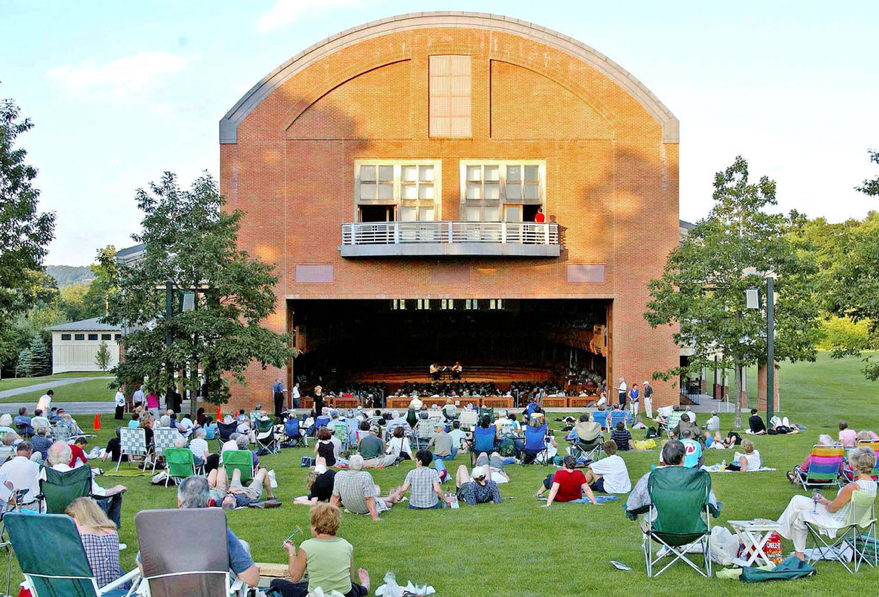
Everyone loves summer, and it’s the perfect season to experience live action – music, theater, and art. There are outdoor art festivals, Shakespeare in parks, and concerts at wineries. There is no better time to Watch Live. Get out there and as Nike says, Do It.We loved our experience at Tanglewood and the evening with Steve Piper at the Lion’s Den.
Now we’re home in Seattle, and last weekend we went to see Lauren Weedman Doesn’t Live Here Anymore, a one-woman show at ACT Theater written and performed by the title character. After the show there was an audience Q and A with the playwright/actress and her director. The play wasn’t perfect; most things aren’t, but the Q and A provided a personal encounter with an artist and a work in progress that gave us insights into the artistic process. I hope you can find a performance close to you that will give you the same experience. Remember… whether you buy a ticket or sit on the lawn it’s better to –


But, as they say, it’s complicated, and no more so than in British writer Ian McEwan’s 2007 novel, On Chesil Beach. Set in 1962, the novel is now a film starring Oscar winner Saoirse Ronan and newcomer Billy Howle as the young couple who hold us spellbound as they attempt to be intimate for the first time on their wedding night.
Theirs is a complicated stew of young love, repression, class differences, dysfunctional family and almost Victorian modesty, and it will break your heart. It’s hard to believe today that love and sex could have been that different in 1962 but it was. The world had not yet reached the tipping point that launched the sexual revolution. The Beatles didn’t arrive on the Brit music scene until following year, the San Francisco Summer of Love was five-years in the future, and the birth-control pill wasn’t yet in wide usage.
For those of us who came of age at that time, the novel is a reminder of our own coming of age, of our first serious sexual experiences and of how lucky we are to have moved beyond the repression and strictures of that time. Younger viewers may feel for the characters but it’s doubtful they will ever be drawn into the story in the same way we are.
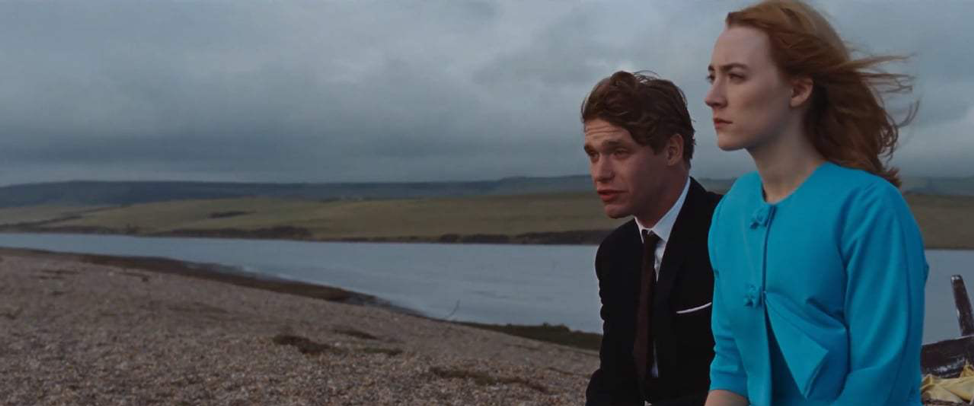
On Chesil Beach is the story of Florence and Edward, two recent university graduates, on their wedding day at a hotel on the English coast. Early in the film we watch their idyllic courtship unfold, full of hope and family drama. She is an accomplished violinist with a chamber group, he a history major with plans to write a series of books. We cheer them as they fall in love and move toward marriage, but they are both inexperienced and fearful. There are obvious stress lines. Following the wedding they travel to a seaside hotel for a short honeymoon where the crux of the novel plays out. There is a climactic scene at the hotel and a long attempt at resolution on the beach, but it doesn’t end well.
On a personal level, I identified uncomfortably with the characters. Their situation was similar in some ways to my own honeymoon. I was married on New Year’s Eve in 1958, 10 days after my 21st birthday. We only had three days before the start of my wife’s winter quarter at school, so we drove to the Oregon Coast and an almost empty seaside hotel where it was cold and lonely, not romantic. We walked on a windy desolate winter beach, swam in a cavernous indoor pool, and ate alone in the hotel’s large dining room. We also spent a lot of time in bed, but it was not the passionate, joyful experience we had expected and hoped for. We were not as clueless as Florence and Edward, but we too were inexperienced and didn’t know how to talk to each other, especially about sex. There were uncomfortable silences and differences that we ignored. We lasted longer than Florence and Edward, but in the end the things we didn’t know caught up with us. We loved each other and our son, Brent, was the gift born of that love, but ultimately we didn’t have the skills to keep the ship from sinking.
The novel, On Chesil Beach, is dense, and the film is slow and painful to watch, but both are worth the effort. I often find fault with movies based on novels, and this one is no exception, even though Ian McEwan wrote the screenplay for his own novel. I preferred the book’s ending but understand that film is a different medium and needed something more for dramatic effect.
It’s a love story until it turns to tragedy in the pivotal scene. Florence and Edward are soul mates who overcome class and family obstacles but can’t get out of their own way to overcome the fear, ignorance, and insecurity that is holding them back. They are tragic in the Shakespearean sense—their fate could have been avoided but ego and pride prevent them from finding a solution.
Toward the end of the book Edward realizes that their failure was avoidable. “At last he could admit to himself that he had never met anyone he loved as much, that he had never found anyone, man or woman, who matched her seriousness.”
“When he thought of her it rather amazed him, that he had let that girl with the violin go. Now, of course, he saw that her self-effacing proposal was irrelevant. All she had needed was the certainty of his love and his reassurance that there was no hurry when a lifetime lay ahead of them. Love and patience—if only he had them both at once—would surely have seen them both through.”
The lyrics of Love is Just a Four-Letter Word help us think differently about love, but the conclusion of On Chesil Beach reminds me of another Joan Baez song that resonates with its tragedy. This is Diamonds and Rust https://www.youtube.com/watch?v=2MSwBM_CbyY
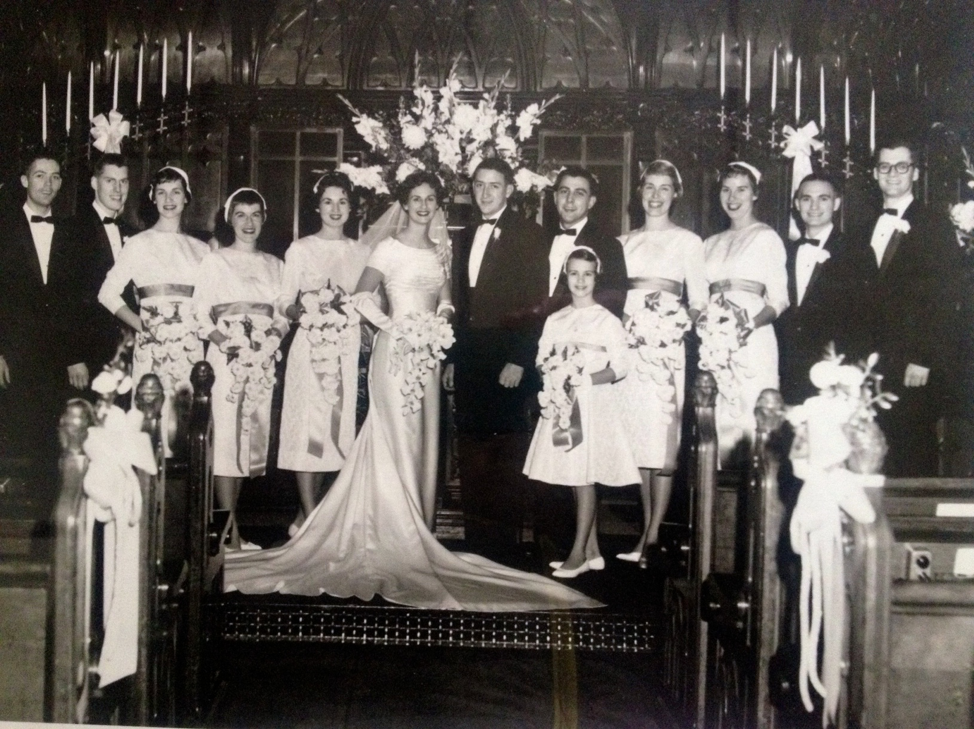
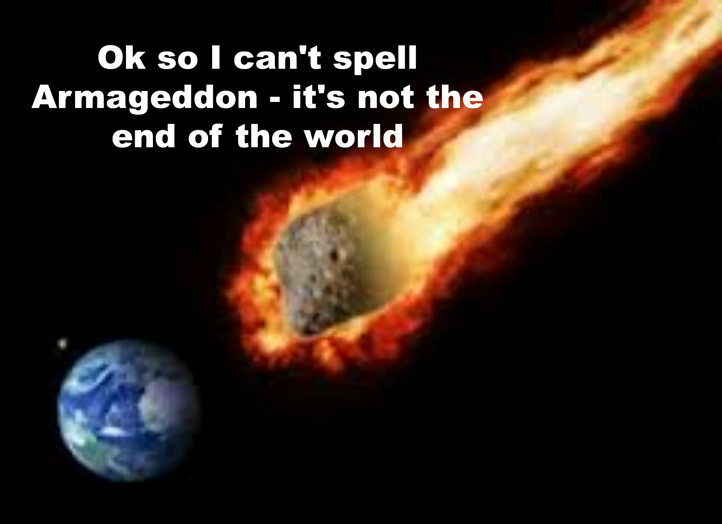
Or is it?
In 1959, the Kingston Trio released a song entitled The Merry Minuet. Catchy little number about the state of world affairs:
They’re rioting in Africa
They’re starving in Spain
There’s hurricanes in Florida
And Texas needs rain
The whole world is festering with unhappy souls
The French hate the Germans, the Germans hate the Poles
Italians hate Yugoslavs, South Africans hate the Dutch
And I don’t like anybody very much!!
But we can be tranquil and thankful and proud
For man’s been endowed with a mushroom-shaped cloud
And we know for certain that some lovely day
Someone will set the spark off
And we will all be blown away!!
They’re rioting in Africa
There’s strife in Iran
What nature doesn’t do to us
Will be done by our fellow man
Is it any wonder that on the first day of the new year, I’m thinking of Armageddon, the End of Days, and the Rapture? The world feels frighteningly unstable as we begin this new year. It’s surreal. Check out the references in the song and bring them forward:
- For man’s been endowed with a mushroom-shaped cloud
And we know for certain that some lovely day
Someone will set the spark off
And we will all be blown away!!
About Me
What's New
“Working toward what I’m leaving behind.” Nick Cave (Artist)








